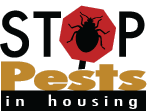Employing Residents in IPM Programs
Residents who build their skills can increase their chances of being employed. The aptitudes they develop through an IPM program may qualify them for the following jobs.
Green cleaners
Residents who understand “green cleaning” and IPM
- use safe and effective cleaners to help reduce triggers of asthma attacks;
- clean so that pests can no longer find food and water in a home;
- inspect for pests, identifying and reporting infestations before they grow and spread;
- prepare a unit for pest control service; and
- take precautions to prevent the spread of pests between clients’ homes.
Prep crew for bed bug treatments
Homes need to be prepared for bed bug treatment before the pest management professional arrives. Poor preparation leads to chronic infestations, multiple treatments, high costs, tensions between those involved, and more time for bed bugs to spread. Some companies charge for preparing for bed bug treatments, but properties may find it economical to hire a person who helps with unit preparation for pest control.
(Note that preparation may involve multiple steps and some physical labor. Elderly or disabled residents may not be capable of such preparation and others may not have the time or desire.)
Peer Educators and IPM Coordinators
Peer educators and IPM coordinators are "connectors"—residents who are known and trusted by others. They're paid to work with fellow residents to help make their homes pest-free. When these spokespeople get good IPM information, they spread the word.
For more information, see The Integrated Pest Management Educator Pilot Project in Boston Public Housing: results and recommendations by C. Condon, H.P. Hynes et al., J. Local Environment. 2007. 12: 223–238.
Licensed Pest Management Professionals
Explore ways of training residents to become competitive in the job market:
- Train residents through a university-industry partnership. After the intensive training, the residents are placed in an apprenticeship, which may lead to a paid position. For more information on this model, contact Lyn Garling at the Pennsylvania IPM Program and the Safer Pest Control Project.
- Start a business with foundation funding that revolves around pest control job creation. For more information, see the model used by Pest@Rest.
